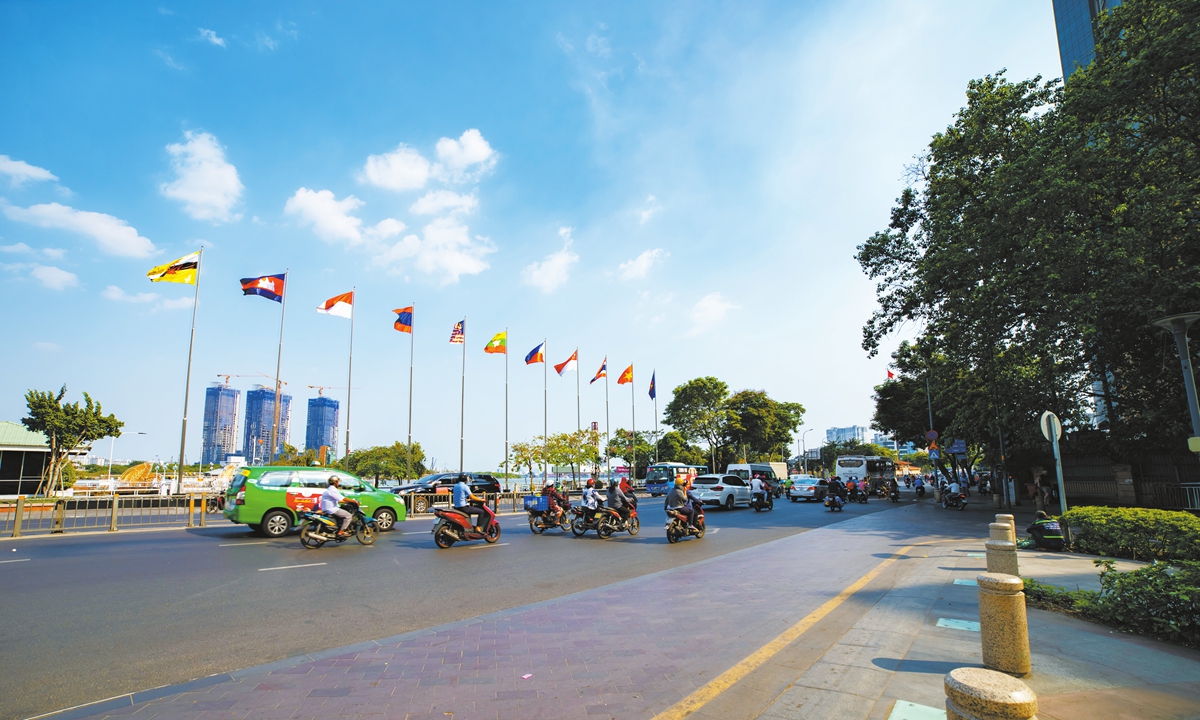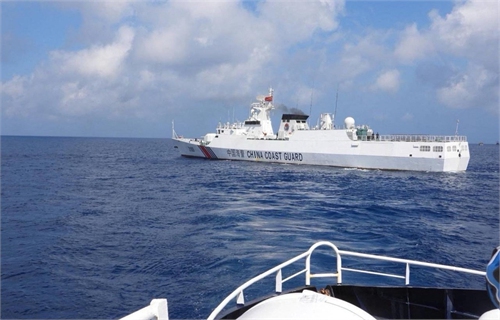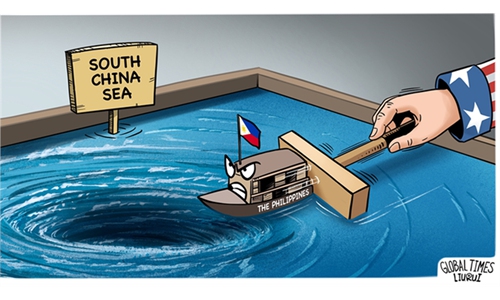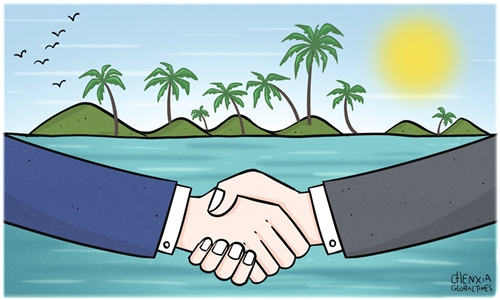
The national flags of ASEAN member countries are shown on the streets of Ho Chi Minh, Vietnam. Photo: VCG
Editor's Note:
"Malaysia-China cooperation demonstrates that unresolved territorial disputes do not necessarily lead to conflict. While the South China Sea disputes are challenging, we share significant common interests," said Peter T.C. Chang (Chang), a research associate at the Malaysia-China Friendship Association in Kuala Lumpur and former deputy director of the Institute of China Studies at the University of Malaya, in an interview with the Global Times (GT). What has been ASEAN's stance toward the persistently rising South China Sea tensions? What messages have ASEAN sent to Manila? Chang shared his views on the issues.
GT: Tensions in the South China Sea have remained persistently high. What do you think are the primary reasons for this?
Chang: First, the territorial disputes in the South China Sea are complex and challenging, and most of us recognize that a quick solution is unlikely. However, not having an immediate resolution doesn't mean we are destined for open conflict. We can agree to disagree and acknowledge that this issue may remain unresolved for some time. We should focus on areas where we can cooperate and coexist, without the necessity of solving this particular problem.
Second, the complexity of the problem has been exacerbated by foreign intervention. External actors, whose interests extend beyond the region, see this issue as part of a broader geopolitical rivalry among great powers and seek to exploit it. Consequently, we have become pawns in a larger geopolitical chess game. Regrettably, some within ASEAN have allowed these external influences to take advantage of the situation. I believe most of us do not wish to be caught in this crossfire.
Third, domestic politics within ASEAN member states can also impede progress. In Malaysia, despite having changed four different prime ministers in recent years, our approach to the South China Sea dispute has remained consistent, with a steadfast commitment to pursuing a diplomatic solution. In contrast, other neighboring countries have experienced more significant policy shifts. The Philippines, for example, illustrates how a sudden change in leadership can dramatically alter the trajectory of the disputes.
GT: At present, what do you think is ASEAN's overall position toward the Philippines' approach, and why do they take this position?
Chang: ASEAN adheres to a non-interference policy in the domestic and foreign affairs of its member states. However, when a member state's actions threaten the collective good, it becomes a cause for serious concern. There is a growing apprehension that the Philippines' current approach to the territorial disputes is heightening the risk of open conflict, which could destabilize the region and undermine overall stability and well-being.
Furthermore, there is a concern that, much like the situation in Ukraine, the support promised to the Philippines may not fully materialize, potentially leaving the country to face a conflict it cannot win on its own.
We have been quietly expressing our concerns (to the Philippines), suggesting that the current approach may not be the most effective way to address the issue. Our hope is to find a more constructive solution to the conflict. While we are deeply concerned, we prefer not to openly criticize our neighbor. Instead, we address these matters discreetly through backdoor channels, private meetings and diplomatic avenues. The message has been conveyed, but we remain uncertain whether it will be enough to alter the current trajectory of the conflict.
GT: The Philippines reportedly approached its neighbors, including Malaysia and Vietnam, to develop a separate code of conduct for the South China Sea. Currently, Manila is also engaging in more military activities and defense cooperation with countries both in and outside the region. How do you evaluate the impact of this approach?
Chang: Malaysia and Vietnam have been clear regarding the code of conduct: We are not interested in developing a separate one. Any lasting solution must involve China and include all the claimants. Excluding China from such an agreement would be futile and meaningless. Both Malaysia and Vietnam have expressed disagreement with Manila's strategy, which appears to be an attempt to drive a wedge between Malaysia and China, or between Vietnam and China.
As a general practice, ASEAN countries conduct joint naval drills and exercises to strengthen bilateral defense mechanisms. However, there is a concern that Manila may use these bilateral drills as a stepping stone to broader exercises, aimed at containing or isolating China, potentially creating divisions within ASEAN. If these drills expand to include external regional powers with the explicit aim of containing China, I believe Malaysia would be reluctant to participate.
GT: Some observers say that US hegemony is waning, with Washington increasingly unable to influence the decisions of other countries. What is your take on this?
Chang: The US is currently facing challenges both at home and abroad, which have somewhat diminished its ability to exert influence. While it may not be as dominant as it was 20 years ago, its power remains substantial, and if misused, it could have damaging consequences for everyone.
The US must use its power responsibly and prioritize diplomatic solutions to conflicts. We understand the challenges they face, but the strongest relationships are built on mutual respect, even amid disagreements. I often remind my American friends that we respect them despite our differences. We sincerely hope they will use their influence for the betterment of both the world and themselves.
Malaysia, China and the US should aspire to coexist and grow stronger together, working toward a world where all nations can thrive and live in harmony.
GT: You have been stressing that ASEAN cannot remain passive in the face of South China Sea tensions. What do you suggest Malaysia and ASEAN do to ease these tensions?
Chang: ASEAN must be proactive in pursuing a diplomatic resolution to the current crisis. ASEAN has consistently opposed the increasing militarization of the South China Sea and must continue to urge all parties to commit to a peaceful resolution.
Next year, Malaysia will assume the Chairmanship of ASEAN. It is crucial that ASEAN reasserts the principle that matters concerning the region should be determined by ASEAN itself. Issues affecting ASEAN should be resolved by its member states, ensuring that any agreements are negotiated between ASEAN and China, rather than being dictated by external powers.
GT: If you had the opportunity to advise the Philippines on its relationship with China, or any other regional country, what advice would you give?
Chang: Malaysia-China cooperation demonstrates that unresolved territorial disputes do not necessarily lead to conflict. While the South China Sea disputes are challenging, we share significant common interests. The Belt and Road Initiative, for example, has brought tangible benefits to the region. We must be willing to set aside our differences in pursuit of the greater common good as failing to do so could lead to disastrous consequences, which we have already seen with the conflicts in Europe and the Middle East.



